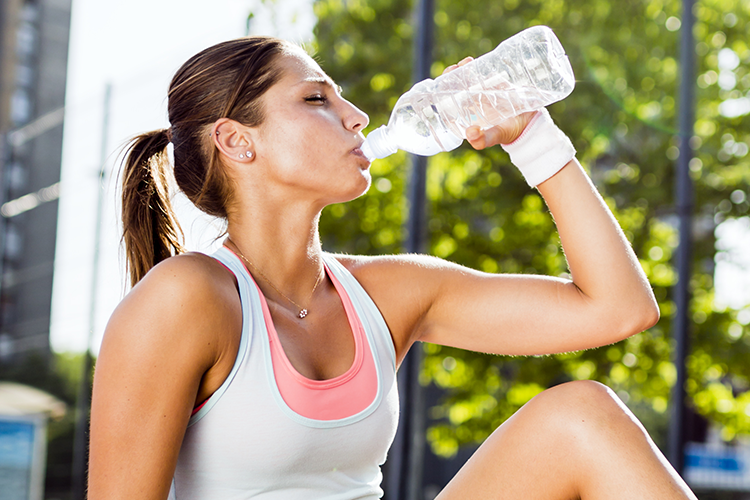Blog
The better alternative to sports drinks
 Soft soda fizzy drink has been the target for discussion, research and blame when associating the consumption of sugar-sweetened beverages with health issues such as dental caries, weight gain, insulin resistance, and even heart disease. But pop is not alone in the land of sugar-sweetened beverages.
Soft soda fizzy drink has been the target for discussion, research and blame when associating the consumption of sugar-sweetened beverages with health issues such as dental caries, weight gain, insulin resistance, and even heart disease. But pop is not alone in the land of sugar-sweetened beverages.
In avoiding soft drink, consumers have turned to other sugar-laden drinks, such as energy drinks, iced teas, and sports drinks. Sports drinks are of particular concern, as people who consume them are under the premise that they are doing themselves a favour, replenishing electrolyte and glycogen stores by chugging back 600ml following a few lunges or soccer practice.
But do we really need that kind of sugar hit?
When to hydrate, when to replenish
Sports drinks are overkill for most. While high-end athletes, training endlessly, will benefit from slamming such drinks fast, most of us do not train enough to justify the 36g of sugar in one bottle of Powerade.
So when, and how, do we replace lost fluids, electrolytes and glycogen?
Water
You sweat, so it is time to rehydrate. Water is needed to carry nutrients and waste throughout the body; regulate body temperature; act as a cushion and lubricant between joints, spinal cord, and eyes; and maintain the structure of large molecules such as glycogen and proteins. It also helps your brain tick, needed for alertness, concentration and memory.
So following exercise, especially when sweating, it is recommended to have some water. Cool. Easy.
Electrolytes
Electrolytes, in addition to water, need only be replaced when working at high intensity for 45 minutes or more, or moderate-intensity for 60 minutes or more.
Glycogen
Glycogen restoration is critical – even for those on a low carbohydrate diet who are trying to use mostly fat for energy (which can begin to kick in after 45 minutes of consistent exercise). And whilst sugar is something we over-consume as a society, to have some post-workout can be really helpful.
Having carbohydrates within 30 minutes will contribute to maximum glycogen replenishment. These keep the enzyme glycogen synthase alive.
Avoid the sugary drinks
Beware that electrolyte formula and sports drinks are laden with added sugar – way too much sugar for any athlete; let alone for our kids at Saturday morning practice.
We also want to avoid artificial sweeteners (which wreak havoc on the gut) and colours (some of which have been named carcinogens and can induce allergic or behavioural issues).
The solution? We have some great homemade options for you!
DIY replenishment!
Remember, with any intensity or duration of exercise, water should always be the first fluid of choice. Then, consider further glycogen and electrolyte replenishment, if required.
Glycogen replenishment
Dates and fruit like a banana or ½ cup of pineapple are good post-workout snack. Have with some raw nuts such as almonds or walnuts to simultaneously help build and repair muscle, and limit any blood glucose highs and lows.
A smoothie with banana, unsweetened almond milk, a pinch of good quality salt and a handful of leafy greens like spinach will offer both glycogen and electrolyte replenishment, supplying minerals such as sodium, magnesium, calcium and potassium.
Electrolyte & fluid replenishment
A great, whole food way to replenish electrolyte stores is to add ½ tsp of good quality salt, ¾ teaspoon sodium bicarbonate (baking soda), hand squeezed juice of 1 lemon, and ½ – 1 tablespoon of honey to 1 litre of water.
Yes, honey is a free sugar and should be limited in the average diet. But when you’ve been going hard at it and sweating for hours, a little is okay. For a lower sugar alternative, simply reduce or omit the amount of honey. Keep in mind that 1 tablespoon is about 5 teaspoons of sugar.
Feel free to experiment and substitute some of the water in the above recipe with coconut water. It is a source of potassium and other beneficial nutrients, but know that it hasn’t yet been proven to be superior to water for hydration.
The takeaway
If you are working out moderately for 45 minutes or less – do not need to eat after. Hydrate with water and get on with the day. If working more intensely, consider using real food to boost glycogen, fluid and electrolyte stores. If persisting beyond 90 minutes, you will need to refuel during the workout. In this case, or if you are a professional or endurance athlete, you should chat with your sports nutritionist or dietician to tailor a diet to optimise your performance and recovery.
Eat real food and power on
Overall it is critical to consume a diet of nourishing, nutrient-dense whole foods for effective and efficient restoration. The better the food choices, the less the likelihood of reaching for Gatorade to get through a 3pm slump, training session or competition.
For optimal energy, performance and recovery, ensure the daily diet is high in a range of fresh whole foods, including vegetables, fruit, beans, nuts, seeds, fish and grass-fed, free-range meat. A diet like this is high in phytochemicals, nutrients and antioxidants, which reduce impact, improve body function, and mitigate the oxidative damage high moderate to high-intensity exercise can cause, helping recovery overall (and in the long run, better performance).











